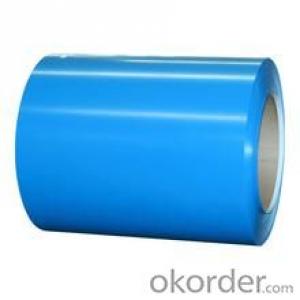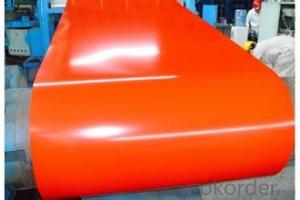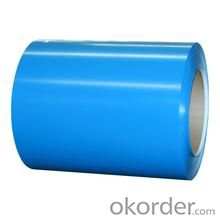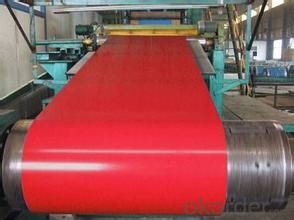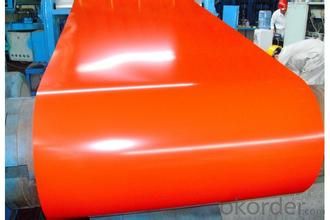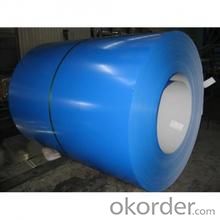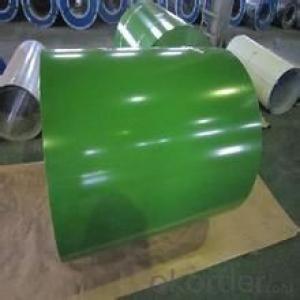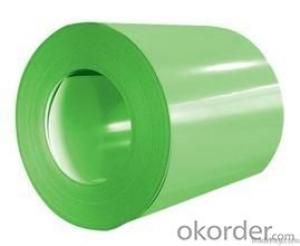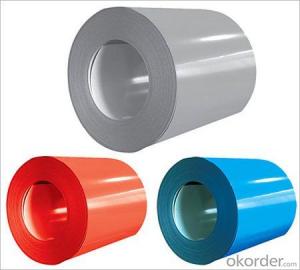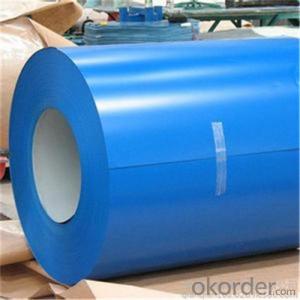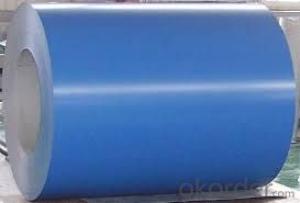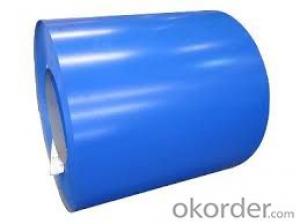Prepainted Galvanized Rolled Steel Coil in China
- Loading Port:
- Tianjin
- Payment Terms:
- TT OR LC
- Min Order Qty:
- 30 m.t.
- Supply Capability:
- 500000 m.t./month
OKorder Service Pledge
OKorder Financial Service
You Might Also Like
Description of Prepainted Galvanized Steel:
Prepainted Galvanized Steel usually refers to have substrateprocessed with surface processed and coated then(roller coated )or bonded organic thin film and baked, and it is able to be processed tofinal prodevtion .
PrepaintedGalvanized Steel qualified with excellent decorative ,formability ,corrosionresistance ,coating adhesion ,can keep for a long time as well as maintainfresh color .For color coated steel sheet can obtain good economicbenefit by steel belt wood ,efficient in construction and save energy ,preventpollution etc.Which is an ideal material;for manufacturing board.
Specifications Of Prepainted Galvanized Steel:
Thickness 0.20-1.2mm (BMT) Width 600-1250mm |
Zinc Coating 100-275g/m2 |
Color According to RAL color fan or as per request |
Internal Diameter 508mm or 610mm |
Coil Weight 3-6MT |
Quality Commercial and structural quality |
Paint Polyester paint for topside, epoxy for reverse |
Standard JIS G 3312, ASTM A755M, EN 10169 |
Base Steel Grade SGCC,SGCD,DX51D+Z,DX52D+Z;S200GD,S220GD,S280GD,S350GD,CS,FS,SS |
Applications OfPrepainted Galvanized Steel:
It can be widely used in transportation, light industry, civil usage and farming. It is also the perfect building material in construction for making steel roofing,insulation panel, corrugate sheet, facade wall,shutters,T-bar and home appliance.
Packaging & Delivery Of Prepainted Galvanized Steel:
The packing of coils consists of anti-damp paper, PVC film, hardboard paper, steel box, strapped with steel strips, fitted with locks and edge protectors and guarantees the optimal condition of the delivered goods. Each coil can be additionally fitted with wooden/steel skids(eye to the side) or wooden pallets(eye to the sky).
Images of Prepainted Galvanized Steel:
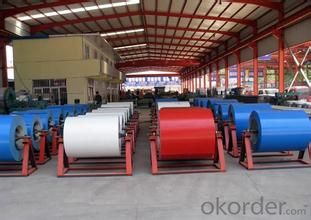
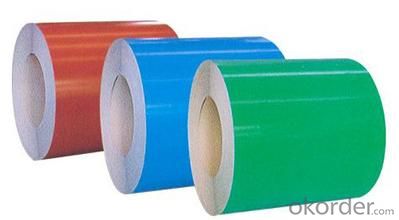
- Q: What are the common applications of hot-dip galvanized steel coils?
- Hot-dip galvanized steel coils are widely utilized across various industries due to their exceptional resistance to corrosion and long-lasting durability. These coils find numerous applications in different sectors, including construction, automotive, appliances, agriculture, electrical and telecommunication, transportation, and industrial sectors. The following are some of the common uses of hot-dip galvanized steel coils: 1. Construction: The construction industry extensively relies on hot-dip galvanized steel coils for applications like roofing, siding, gutters, and downspouts. The coils' corrosion resistance ensures that structures can withstand harsh weather conditions, resulting in low-maintenance and long-lasting buildings. 2. Automotive: In the automotive sector, hot-dip galvanized steel coils are widely employed for manufacturing body panels, frames, chassis, and structural components. These coils provide enhanced protection against rust and offer high strength, ensuring the longevity of automotive parts. 3. Appliances: Hot-dip galvanized steel coils are utilized in the production of various household appliances such as refrigerators, air conditioners, ovens, and washing machines. The coils' corrosion resistance and aesthetic appeal make them an ideal choice for these appliances. 4. Agriculture: The agricultural sector commonly uses hot-dip galvanized steel coils for constructing greenhouses, livestock shelters, fences, and irrigation systems. The galvanized coating protects the steel from corrosion caused by exposure to moisture and chemicals commonly found in agricultural settings. 5. Electrical and Telecommunication: The electrical and telecommunication industries employ hot-dip galvanized steel coils for manufacturing transmission towers, poles, cable trays, and electrical conduits. These coils' corrosion resistance and high strength ensure the safety and reliability of these infrastructure components. 6. Transportation: Hot-dip galvanized steel coils play a significant role in the transportation industry, particularly in manufacturing trailers, shipping containers, and chassis components. The galvanized coating provides protection against corrosion caused by road salt, moisture, and various environmental factors. 7. Industrial Applications: Hot-dip galvanized steel coils are widely used in various industrial applications, including storage tanks, pipelines, ductwork, and industrial equipment. The coils' corrosion resistance and durability ensure the integrity and longevity of these structures and equipment. In conclusion, hot-dip galvanized steel coils have a wide range of applications in industries such as construction, automotive, appliances, agriculture, electrical and telecommunication, transportation, and industrial sectors. The coils' corrosion resistance, durability, and aesthetic appeal make them a versatile and extensively used material in these applications.
- Q: What is the difference between black steel pipes and galvanized steel pipes when used for water or gas, and why?
- Just because two things are painted red doesn't mean that they're the same. You need to know what type of iron (if it really is iron, but doubtful) your black iron pipe is made from. Sometimes standard pipe used in commercial applications for plumbing is called black pipe by the contractors. This type of black pipe is usually A53. Pipes can come in many types of grades of steel. Is the pipe A500, A53, A106, etc? Each grade has slightly different chemical compositions that give the steel different mechanical characteristics. Also, pipe can come in different schedules (wall thicknesses) which does not change the outside diameter of the pipe. With an increase in wall thickness a pipe will become more rigid.
- Q: How are steel coils packaged for transportation?
- Steel coils are commonly prepared for transportation through various methods in order to guarantee their secure and safe delivery. The packaging procedure consists of multiple steps that serve to shield the coils from harm during transit and facilitate their handling and loading onto trucks, ships, or trains. To begin with, steel coils are tightly wound and fastened using steel straps or bands to maintain their compactness and prevent unwinding. These straps are typically made from high-strength steel and securely fastened at regular intervals around the coil's circumference. This not only preserves the coil's shape but also prevents any movement while in transit. Following this, the coils are frequently positioned on wooden or steel pallets to establish a stable foundation and enable easy handling with forklifts or cranes. The pallets are usually tailored to fit the dimensions of the coils and designed to withstand the weight and stress of the loaded coils. In order to provide additional protection, steel coils are often enveloped in a layer of protective material such as plastic or paper to shield them from moisture, dust, and other potential contaminants. This wrapping also serves to prevent any scratching or damage to the coils' outer surface. Moreover, to ensure the coils remain secure and avoid shifting during transit, they are oftentimes housed within a steel or wooden crate. These crates offer an extra layer of protection and stability, particularly when transporting larger coils or multiple coils together. Lastly, once the coils are properly packaged, they are typically loaded onto flatbed trucks, shipping containers, or railway cars for transportation. During the loading process, great care is taken to ensure the coils are positioned securely and that weight distribution is balanced to prevent any potential damage or accidents while in transit. In conclusion, steel coils are packaged for transportation by securely binding them with steel straps, placing them on pallets, covering them with protective material, and, if necessary, enclosing them within crates. This packaging procedure serves to safeguard the coils and guarantee their secure and efficient transportation to their intended destination.
- Q: How are steel coils used in the production of agricultural trailers?
- Steel coils are used in the production of agricultural trailers to provide strength and durability. The coils are shaped into various components of the trailer's structure, such as the frame and chassis. This ensures that the trailer can withstand heavy loads and rough terrain, making it suitable for transporting agricultural equipment and produce.
- Q: How are steel coils loaded onto trucks or containers?
- Steel coils are typically loaded onto trucks or containers using specialized equipment such as cranes or forklifts. The coils are carefully lifted and positioned onto the truck or container bed, ensuring proper weight distribution and securing them with straps or chains to prevent any movement during transportation.
- Q: What are the dimensions of steel coils used in the construction equipment industry?
- The dimensions of steel coils used in the construction equipment industry can vary depending on the specific application and requirements. However, there are common standard dimensions that are often used. Steel coils used in the construction equipment industry typically have a width ranging from 600mm to 2000mm. The thickness of these coils can range from 0.5mm to 25mm or even higher, depending on the intended use and structural requirements. The weight of steel coils used in construction equipment industry can vary significantly, ranging from a few hundred kilograms to several tonnes. The weight is typically determined by the dimensions and thickness of the coil, as well as the specific grade and type of steel being used. It is important to note that these dimensions are not fixed and can be customized based on the specific needs of the construction equipment industry. Manufacturers and suppliers can provide steel coils in various dimensions to meet the specific requirements of construction equipment manufacturers and contractors.
- Q: Does anyone have any idea where I could get a necklace that has the British Steel by Judas Priest logo?
- Bristish Steel...ROCKS!!! Ebay is a good suggestion but if its something custom like that you could always bring in a drawing or picture to a jeweler and they can source it for you ;) I did something similar and the jeweler actually made it custom for me.... just a suggestion :) Good Luck!
- Q: what do we use steel for and whyand why do we use brass for instrumentsplz help its homework and i cant find the answer anywhere : (
- By instruments do you mean musical instruments? Brass is used for musical instruments because it's strong but very malleable. It's easy to hammer and roll into sheets, or form into tubes and complex shapes. It's easy to work with using hand tools. It's also very corrosion resistant and polishes very well. It has an attractive gold-like color. It also has some effect on sound, though the shape and design of an instrument is much more important to the sound than the material that's used. Apart from musical instruments, brass is used for items that need to be both durable, easy to manufacture, and resistant to the elements. For example plumbing items like valves and screw couplings.brass is a lot easier to cut with machine tools than steel. It's also traditionally used for hardware on doors and cabinets because of it's color, low friction properties, and corrosion resistance. Brass also is toxic to bacteria, and so brass doorknobs disinfect themselves after about 9 hours. Steel is very strong and very cheap. Steel is basically iron with a small amount of carbon added which makes it much stronger. Iron is the fourth most common element in the earth's crust, after oxygen, silicon, and aluminum. Brass being a mixture (an alloy) of copper and zinc, with other metals sometimes added. Copper and zinc are the 27'th and 26'th most common elements. Therefore, it make sense that brass is much more expensive than steel. Steel is used for too many things to be listed. The use of steel technology has impacts on almost every aspect of modern life. Nearly all of the man-made objects you touch on a regular basis were made using steel tools and steel machinery.
- Q: What are the common applications of cold-rolled stainless steel coils?
- Cold-rolled stainless steel coils are widely used in various industries due to their unique characteristics and versatility. Some common applications of these coils include: 1. Automotive Industry: Cold-rolled stainless steel coils are used in the automotive industry for manufacturing parts such as exhaust systems, trim, and body panels. The high corrosion resistance and aesthetic appeal of stainless steel make it an ideal choice for these applications. 2. Construction Industry: Stainless steel coils are extensively used in the construction industry for roofing, cladding, and structural components. The durability, strength, and resistance to corrosion make cold-rolled stainless steel coils a preferred material in buildings, bridges, and other infrastructure projects. 3. Kitchen Appliances: Stainless steel coils are commonly used in the production of kitchen appliances such as refrigerators, ovens, and dishwashers. The hygienic properties, easy maintenance, and sleek appearance of stainless steel make it a popular choice for these applications. 4. Food Processing Industry: Cold-rolled stainless steel coils find extensive use in the food processing industry due to their non-reactive nature and resistance to corrosion. These coils are used for manufacturing equipment, storage tanks, and conveyor systems in food processing plants. 5. Medical Equipment: Stainless steel coils are widely used in the medical industry for manufacturing surgical instruments, implants, and medical devices. The biocompatibility, strength, and resistance to corrosion of stainless steel make it suitable for these critical applications. 6. Oil and Gas Industry: Cold-rolled stainless steel coils are used in the oil and gas industry for various applications, including pipelines, storage tanks, and offshore platforms. The high resistance to corrosion and extreme temperature conditions make stainless steel a reliable choice in this demanding industry. 7. Aerospace Industry: Stainless steel coils are employed in the aerospace industry for manufacturing aircraft components, engine parts, and structural elements. The lightweight yet high-strength properties of stainless steel make it an ideal material for these applications. Overall, the common applications of cold-rolled stainless steel coils span across diverse industries, including automotive, construction, kitchen appliances, food processing, medical, oil and gas, and aerospace. The unique combination of durability, corrosion resistance, strength, and aesthetic appeal make stainless steel coils a preferred choice in various industrial sectors.
- Q: How are steel coils coated to prevent rust and corrosion?
- Steel coils are coated to prevent rust and corrosion through a process called galvanization. This involves immersing the coils in a bath of molten zinc, which forms a protective layer on the steel surface. This zinc coating acts as a barrier, preventing oxygen and moisture from reaching the steel and causing rust. Additionally, the zinc coating provides sacrificial protection, meaning that even if the steel is exposed due to scratches or abrasions, the zinc will corrode before the steel, further enhancing its longevity and resistance to rust and corrosion.
Send your message to us
Prepainted Galvanized Rolled Steel Coil in China
- Loading Port:
- Tianjin
- Payment Terms:
- TT OR LC
- Min Order Qty:
- 30 m.t.
- Supply Capability:
- 500000 m.t./month
OKorder Service Pledge
OKorder Financial Service
Similar products
Hot products
Hot Searches
Related keywords
